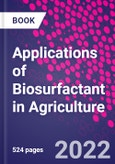Applications of Biosurfactant in Agriculture explores the use of beneficial microorganisms as an alternative to current synthetic plant protection strategies. The book highlights a range of renewable raw substrates including agro-industrial waste as a dependable and cost-effective technology for the mass production of biosurfactant, emphasizes the formulation of biosurfactants using a full-factorial design, scientometric assessment, and presents mathematical modeling for the enhancement of production processes. Recent biotechnological techniques such as functional metagenomics that could help in the molecular characterization of novel biosurfactant with multifunctional activities majorly from uncultured and unexploited microbes available in the soil biosphere are also explored.
This book identifies possible modes of action by which nutrients are normally released to plants through the formation of metal-biosurfactant complexes and presents recent research findings on the utilization of biosurfactants for the management of mycotoxins and microorganisms when evaluated in the field and in greenhouses. Finally, the book emphasizes the application of biosurfactants as a form of potent antibiotics for the management of several zoonotic diseases and in animal husbandry.
Please Note: This is an On Demand product, delivery may take up to 11 working days after payment has been received.
Table of Contents
1. Post-harvest management of fruits and vegetables2. Biological control activity of biosurfactant against Plant Pathogen
3. Application of biosurfactant as a replacement to synthetic surfactant used in pesticide industries
4. Biosurfactant as Biostimulant: Factors Responsible for Plant Growth Promotions
5. Production and Commercialization of biosurfactant for Plant Disease Management
6. Significant of advanced methodologies for effective production of biosurfactant from diverse microbial population most especially from uncultivated agricultural soil
7. Cultivation of biosurfactant on Cheap Energy Sources most especially on agricultural wastes
8. Application of biosurfactant as antibiotics for the management of diseases affecting livestock
9. Application of biosurfactants for the management of mycotoxins
10. Screening of efficient strains of agrobiotechnological significant that could produce a high yield of biosurfactant
11. The potential of biosurfactant for improving the bioavailability of nutrient for beneficial plant-associated microbes
12. Synergetic effect of biosurfactant with bioherbicides and their effectiveness in the management of weeds
13. Understanding Mechanisms Underlying genes regulating the production of biosurfactant
14. Molecular and cultural techniques for the characterization of biosurfactant producing strains
15. Microbial biostimulants in protecting against nematodes
16. Microbial biostimulants for the management of insect pests and diseases
17. Biosurfactant for soil bioremediation
Authors
Inamuddin Assistant Professor, Department of Applied Chemistry, Zakir Husain College of Engineering and Technology, Faculty of Engineering and Technology, Aligarh Muslim University, Aligarh, India.Dr. Inamuddin is an Assistant Professor at the Department of Applied Chemistry at the Zakir Husain College of Engineering and Technology, Aligarh Muslim University, Aligarh, India. He has extensive research experience in multidisciplinary fields of analytical chemistry, materials chemistry, electrochemistry, renewable energy, and environmental science. He has worked on different research projects funded by various government agencies and universities and is the recipient of several awards, including the Fast Track Young Scientist Award and the Young Researcher of the Year Award 2020, Aligarh Muslim University, India. He has published nearly 200 research articles in various international scientific journals, 18 book chapters, and numerous edited books with well-known publishers.
Charles Oluwaseun Adetunji Full Professor and Lecturer in the Microbiology Department at Faculty of Sciences, Edo State University Uzairue (EDSU), Nigeria.Prof. Charles Oluwaseun Adetunji is a full Professor at the Department of Microbiology, Faculty of Sciences and the Director of Research and Innovation, Edo State University Uzairue (EDSU), Edo State, Nigeria. He formerly served as the Acting Director of Intellectual Property and Technology Transfer, Head of the Department of Microbiology, and Sub Dean of the Faculty of Science. Currently, he holds the positions of Chairman of the Grant Committee and Dean of the Faculty of Science at EDSU.
Prof. Adetunji is a Fellow of the Royal Society of Biology in the UK. Additionally, he serves as a Visiting Professor and the Executive Director of the Center for Biotechnology at Precious Cornerstone University, Nigeria. His research centers on applying biological techniques and microbial bioprocesses to achieve Sustainable Development Goals (SDGs) and contribute to advancements in agriculture.








